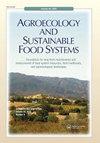种子交换网络是墨西哥高地地区玉米多样性保护和种子获取的重要过程
IF 2.6
3区 农林科学
Q1 AGRICULTURE, MULTIDISCIPLINARY
引用次数: 0
摘要
本文章由计算机程序翻译,如有差异,请以英文原文为准。
Seed exchange networks as important processes for maize diversity conservation and seed access in a highland region of Mexico
ABSTRACT Seed exchanges that smallholder households perform form networks that are central to in situ agrobiodiversity conservation. Sociodemographic factors such as market accessibility and household assets could be shaping the structure of these networks and impacting diversity, however formal evidence is scarce. Through surveys in nine rural communities in the Cofre de Perote highland region in Mexico, we modeled seed exchange networks for native maize and conducted a social network analysis followed by statistical modeling. Results show that access to urban centers is negatively related to the robustness of community networks. Within communities, households with bigger plots, more time producing, sufficient maize for self-consumption, and fewer members were able to save seeds for the next cropping season and were more likely to donate seeds. Additionally, households that exchanged more produced more maize morphotypes. We conclude that the maize seed networks under study are serving as seed reservoirs for families in case of scarcity, thus contributing to food security. They are also important for in situ agrobiodiversity conservation of six maize morphotypes. However, it is necessary to promote seed exchanges between households of communities with more access to urban centers, to strengthen networks, and preserve their maize diversity and seed scarcity-dampening function. GRAPHICAL ABSTRACT
求助全文
通过发布文献求助,成功后即可免费获取论文全文。
去求助
来源期刊

Agroecology and Sustainable Food Systems
AGRICULTURE, MULTIDISCIPLINARY-GREEN & SUSTAINABLE SCIENCE & TECHNOLOGY
CiteScore
4.80
自引率
7.70%
发文量
73
期刊介绍:
Agroecology and Sustainable Food Systems is devoted to the rapidly emerging fields of agroecology and food system sustainability. By linking scientific inquiry and productive practice with transformative social action, agroecology provides a foundation for developing the alternative food systems of the future. The journal focuses on the changes that need to occur in the design and management of our food systems in order to balance natural resource use and environmental protection with the needs of production, economic viability, food security, and the social well-being of all people.
Agroecology and Sustainable Food Systems examines our current food systems from production to consumption, and the urgent need to transition to long-term sustainability. The journal promotes the study and application of agroecology for developing alternatives to the complex problems of resource depletion, environmental degradation, a narrowing of agrobiodiversity, continued world hunger, consolidation and industrialization of the food system, climate change, and the loss of farm land. The journal uses a food systems approach, and seeks experiences in agroecology that are on-farm, participatory, change-oriented, and backed by broad-based methodologies of sustainability analysis and evaluation.
 求助内容:
求助内容: 应助结果提醒方式:
应助结果提醒方式:


